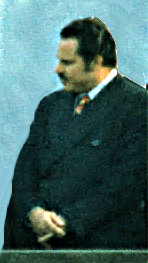Ali Nasir Muhammad
| Ali Nasir Muhammad علي ناصر محمد الحسني |
|
|---|---|

Nasir in East Berlin, 1978
|
|
| Chairman of the Presidium of Supreme People's Council (South Yemen) | |
|
In office 21 April 1980 – 24 January 1986 |
|
| Preceded by | Abdul Fattah Ismail |
| Succeeded by | Haidar Abu Bakr al-Attas |
| Chairman of the Presidential Council (South Yemen) | |
|
In office 26 June 1978 – 27 December 1978 Acting: 26 June 1978 – 1 July 1978 |
|
| Preceded by | Salim Rubai Ali |
| Succeeded by |
Abdul Fattah Ismail (As Chairman of the presidium of Supreme People's Council) |
| Prime Minister of South Yemen | |
|
In office 2 August 1971 – 14 February 1985 |
|
| Preceded by | Muhammad Ali Haitham |
| Succeeded by | Haidar Abu Bakr al-Attas |
| 2nd General Secretary of the Yemeni Socialist Party | |
|
In office 21 April 1980 – 24 January 1986 |
|
| Preceded by | Abdul Fattah Ismail |
| Succeeded by | Ali Salem al Beidh |
| Personal details | |
| Born | 1939 (age 77–78) |
| Political party | Socialist Party |
| Other political affiliations |
National Liberation Front |
Ali Nasir Muhammad Husani (Arabic: علي ناصر محمد الحسني) (born 1939) was twice president of South Yemen and once the Prime Minister. He served as the Prime Minister from 2 August 1971 until 14 February 1985 and as Chairman of the Presidential Council from 26 June 1978 - 27 December 1978. In April 1980, South Yemeni president Abdul Fattah Ismail resigned and moved to Moscow. His successor was Ali Nasir Muhammad who took a less interventionist stance toward both North Yemen and neighbouring Oman. On January 13, 1986, a violent struggle began in Aden between Ali Nasir's supporters and supporters of the returned Ismail. (See South Yemen Civil War) Fighting lasted for more than a month and resulted in thousands of casualties, Ali Nasir's ouster, and Ismail's death. Muhammad's term had lasted from 21 April 1980 to 24 January 1986. Some 60,000 people, including the deposed Ali Nasir, fled to North Yemen. He was succeeded by Haidar Abu Bakr al-Attas.
In 1978, Ali Nasir Muhammad overthrew and executed Rubai Ali, after a short battle which took place in Almodowar Palace, located in At-Tawahi, Aden, which Rubai Ali used as a fortification.
Mohammed was a member of the National Front, ar. الجبهة القومية (NF) as well as the Yemeni Socialist Party (YSP - الحزب الاشتراكي اليمني ) after the YSP was formed from the UPONF in October 1978. During the 1994 Civil War in Yemen, he pushed his supporters to operate alongside the forces of Sana'a government and against the recently re-established Democratic Republic of Yemen, seeking revenge for his ouster. The southern secession was repressed in July 1994 after the surrender of Aden and Mukalla strongholds.
...
Wikipedia
